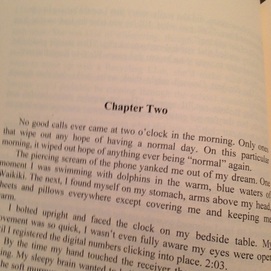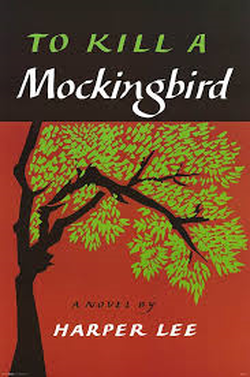 A few weeks ago, I wrote this essay as a guest post on the blog by author Nancy Pennick. In case you missed it there, I thought I'd repeat it here. “No good calls ever came at two o’clock in the morning. Only ones that wipe out any hope of having a normal day. On this particular morning, it wiped out hope of anything ever being “normal” again.” This was supposed to be the opening line of my novel Cry of the Sea. I was so proud of it. So proud! Yes, I envisioned its brilliance being quoted as one of the great opening lines of YA literature at many a writer’s conference for years to come. I loved it so much that no matter what I felt about the rest of the chapter, I was determined to keep that first line. Why was I so sure? Or stubborn? I have attended so many writing workshops and read so many books and articles about the craft of writing novels. Several things have been drummed into my head. “Have a great opening line.” “Hook your reader from the first moment.” “Start where the action is.” “Start your novel where the protagonist’s life changes from its normal routine.” “Start on the day that is different.” And my favorite? “Get to the main point of the plot before page 30.” So, I had this idea for a story about a girl who discovers mermaids caught in an oil spill. Based on everything I’ve learned, that meant she had to find the mermaids before page thirty. I also felt strongly that the story needed to start in the moments just before finding those mermaids. How best to do this? I thought it would be exciting to have her wake up to the alarming news of the oil spill and have her rushing out the door with her environmentalist father to get to the beach. There were some problems with my idea. I had to somehow very quickly introduce my main character and her father, their relationship, and the reason they were going to an oil spill. There was a lot of information to share to have the story make any sense. I thought I’d be clever and get some of that out with a little flashback to the night before in order to explain a few things. Only, that flashback grew from a few paragraphs to a dozen pages before coming back to the big rush to the beach. More important writing advice haunted me: “Don’t have a big flashback in the opening chapter.” “Don’t info dump.” “Show don’t tell.” Oh, poo on all of that. I had an awesome opening line! It had to stay this way. Well… I sent my first chapter to a few agents and editors. No one sent me back praise for my glorious first line. No one requested more pages either. I grew frustrated. Yet, I didn’t revise. I’d already revised the book over and over, and I didn’t know how to do it again. Not without ruining my opening line. The writing advice I knew conflicted in my brain. Bless the team at Fire and Ice, though. They stumbled past my opening chapter and read on to find the story that followed it. They offered to publish the book and sent Megan Orsini, my editor, to help me out. Her very first note to me: “I think the flashback in the opening chapter is too long. I forgot it was a flashback. Why don’t you make that the opening chapter and put the phone call and oil spill scene in chapter two.” But… but… That would put my opening line in chapter two. Do you hear me whining? I knew Megan was right, and I followed her advice. I wound up completely rewriting the whole opening to my book. With her guidance, I actually revised the opening chapter six times and the first page an additional two after that. Now my opening line is: “You ready to see how the next big change in your life is going to look” as asked by June’s father. No, this won’t put me in any lists of great opening lines, but it works. The book works better too. And guess what? We still meet mermaids on page 22. Yay! So, friends, what I’ve learned: don’t marry your words and do trust your editor. With a sly wink, however, I’m happy to announce that a woman who recently reviewed Cry of the Sea on her blog included a quote from my book. Which of my words did she use? My opening line – of Chapter Two.  Recently I saw an American Masters special on PBS about Harper Lee, the author of the classic children's novel To Kill a Mockingbird. Like most people, I've always loved the novel and considered it to be "perfect" books that have such depth and wisdom while still being entertaining to read. So, I was a bit startled to find out while watching the biography that this novel didn't flow easily from Lee's pen. She wrote it over a long period of time, and even after a year of dedicated work, quitting her job to devote all her time on it, the book was still not fully formed or publishable. Thankfully, agent Maurice Crain saw magic in her words and concept. Not many agents these days would take on a never published author whose work showed promise but was far from complete. I find that agents at writing conferences are always talking about how they enjoy helping authors mold their pieces, but the guidelines at their websites make it clear that they want books that are as close to publishable as possible. At any rate, Crain accepted her novel and sold it under the working titled of Atticus to editor Tay Hohoff at J. B. Lippencott publishers in New York. Hohoff said that the book was really a collection of short stories when he accepted it. "There were dangling threads of plot, there was a lack of unity - a beginning, a middle, an end that was inherent in the beginning," he remembered in an interview. He also said, "The editorial call to duty was plain." Again, I marvel at the fact that a publisher, knowing the book needed substantial work, took the project on and had faith it would turn out right in the end. With Hohoff's guidance, Harper Lee rewrote her novel three and half times and gave it the new now-famous title before it was ready to publish. It has been conjectured that one of the reasons Harper Lee didn't release a second novel until decades later is due to the fact that Hohoff retired and her agent, Maurice Crain, passed away. She was very reliant upon their help. This quote from Louisa Thomas of Newsweek in her article "Who Helped Harper Lee With Mockingbird?" sums it up: "We like to think of writers, like heroes, as isolated beings. To an extent, it's true; writing is often lonely and painful, a confrontation between the self and the blankness of the page. But a book is also shaped by the system of editors, agents, publishers, teachers, and readers." So, remember as you struggle with your drafts: even the great authors have to revise. It's old-fashioned, I know, but another good trick for helping with rewrites is to write a first draft by hand. In this age of lap tops, iPads and other convenient mobile devices, sometimes we forget we can just carry a notepad and a pen around with us wherever we go. I wrote the first draft of my novel For a Speck of Gold completely in cursive on yellow notepads when I was working at an after school program back in the early 2000s. While the kids were doing their assignments, I jotted down my ideas. I have written a number of short stories this way while sitting in waiting rooms while my daughter was taking dance or swim lessons.
While this might seem like a waste of time to some - I mean, writing into the computer and saving it is so much easier - think of it as an exercise. I find that I don't write as much by hand as I do when typing, probably because my hand hurts after a while. So, when I go to copy what I've created into my computer, I do an automatic rewrite. I fill in the light paragraphs, fix the obvious mistakes, catch a lot of the repeating words. What this means is, the first draft to be on my computer is already a second draft. Give it a try and see how it works for you. About 12 years ago I began writing my novel Cry of the Sea. I wrote it very quickly, and I thought it was pretty cool. No one wanted to read it, though. So, I took it to the SCBWI-Midsouth conference about five years ago and had an editor-critique session about the first chapter and outline. She was very nice but told me all the problems I had with it, including that the book was way too short. I was pretty broken and pushed the book aside to work on other projects. Then, 3 years ago, SCBWI offered a novel revision workship, hosted by an author I love named Helen Hemphill. I brought my pages and my notebook and got lots of great ideas. Finally, I knew what to do! You want to know what the solution was?
I scrapped the book. Yep. Except for the core idea, I pretty much let the rest fall away and started over again. I'm proud of the outcome, and it definitely got a lot more views by editors when I started submitting. Fire and Ice Young Adult Novels picked it up last year, and it will be in print and ebook in just a couple weeks! So, I'm starting a blog about rewriting and revising manuscirpts. I'm going to start out the next couple weeks by showing you how some of my work has changed drastically from first draft to final draft. Then I hope to begin inviting other authors to show examples of their rewrites. I hope you find this fun and educational! |
D. G. DriverAward-winning author of books for teen and tween readers. Learn more about her and her writing at www.dgdriver.com Archives
July 2024
Categories
All
|
Author D. G. Driver's
Write and Rewrite Blog
“There are no bad stories, just ones that haven’t found their right words yet.”
A blog mostly about the process of revision with occasional guest posts, book reviews, and posts related to my books.

 RSS Feed
RSS Feed